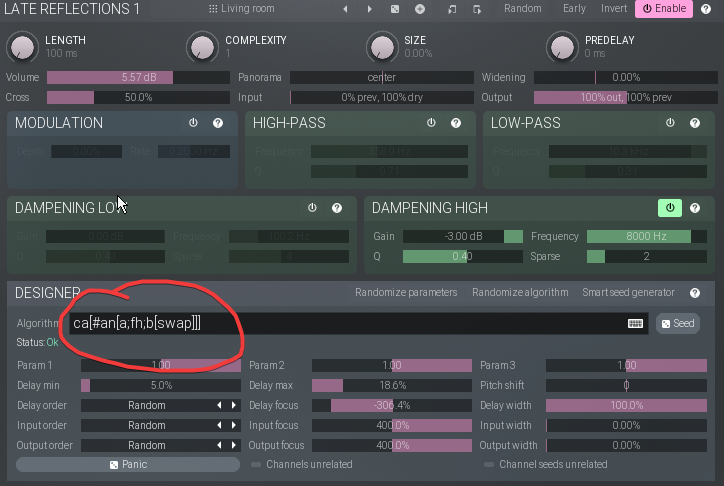for those who are unaware, the melda suite of plugins has two plugins, MTurboFilter and MTurboReverb, which allow for the user to write custom filter and reverb algorithms. It's a text-based editor, and you can past user-made algos into it.
I'm sort of astonished that this feature isn't talked about more. It's soo cool. Here's some of the algos that I've made.
oh also i haven't included the algos that lukas and amfi have made since they didn't explicitly give me permission to do so. This whoel thing is largely a collaborative process between us three, they just tend to be a little more normal about what they want to zshare publically online lol
A LOT OF THESE TEND TO EXPLODE!!!! MAKE SURE YOU USE A SAFETY LIMITER AND DC FILTER AND ALL THAT
#cnb($1;{$2 * 50})[fh] - #sucks
p[#cn($1, $2)[fh; v; #fam]]
fdn({$1 * 100})[freqshift;#sat]
fdn({$1 * 100})[freqshift({$3 *10}; {$2 * 1000});#sat; #fh]
fdn[#[fh;pitch]] - extremely simple tool for messing with tonal and temporal perceptionCross (12) [ #s [ pitch ( 800 ; {$1 * 12} ; {$2 * 12} ] ] ; fdn (16) [ f (4000;highshelf;1;10) ; sat ]

python script to generate some kinda goofy modal-like networks
num = int(input("complexity: "))
skew = float(input("skew: "))
analog = float(input("analog: "))
output = "p[l;s["
for i in range(num):
output += "s[lp(f*"+str((i+1)*skew)+";;;"+str(analog)+");hp(f*"+str((i+1)*skew)+";;;"+str(analog)+")];"
output += "]]"
print(output)
p[l;s[s[lp(f*1;;;0.5);hp(f*1;;;0.5)];s[lp(f*2;;;0.5);hp(f*2;;;0.5)];s[lp(f*3;;;0.5);hp(f*3;;;0.5)];s[lp(f*4;;;0.5);hp(f*4;;;0.5)];s[lp(f*5;;;0.5);hp(f*5;;;0.5)];]]
also heres some simple barebones docs i made for myself to use with mturboreverb since the melda docs are kind of nightmarishly formatted
containers
| s | Serial | [submodule1;submodule2;...] |
| p | Parallel | ‘’ |
| pw | Parallel Weighted | (w1;w2...)[submodule1;submodule2;...] |
| cn, cnb | comb w/ nesting | (decay;time) [submodule1;submodule2;...] |
| an | allpass w/ nesting | (decay;time) [submodule1;submodule2;...] |
| fdn | feedback delay network size controled by complexity if not specified | (size) [submodule1;submodule2...submoduleN]for example: fdn[#[fl;fh]] is an fdn of size # where each feedback channel is processed w/ the dampening filters. |
basic processors
| d | delay. if time not specified, it’s randomized | d(t) |
| c | comb | c(decay;time) |
| cb | comb, lets input pass as well | c(decay;time) |
| a | allpass | c(decay;time) |
| fl | low shelf controlled by damp low panel | |
| fh | ||

